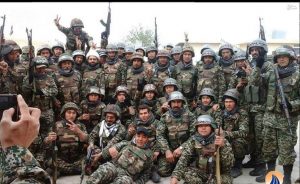With ISIS militarily defeated in Syria and Iraq, the Fatemiyoun Division, an all-Afghan Afghan Shiite militia group fighting in Syria, says its fighters will join the Lebanese Hezbollah and Iranian-sponsored Iraqi militia groups to fight Israel next. In a statement released on Tuesday, Fatemiyoun commanders and fighters congratulated Iran’s Supreme Leader Ali Khamenei and Iranian Quds Force Commander Major General Qassem Soleimani on the fall of the Islamic State in Syria and Iraq, and emphasized that they will continue to fight alongside the “axis of resistance” to annihilate Israel. “Thanks to the leadership of the Leader of the Islamic World [Khamenei] and your [Soleimani’s] supreme command and prudence, a group of men have now emerged from Afghanistan and joined the axis of resistance. With their respected commander, they have sworn that they will not sit down until the elimination of the international Zionism.” After the seizure of the border town of Abu Kamal by pro-Damascus forces, Iranian leaders declared victory in Syria, like reported by mei.edu.
The Afghan militia group also sent a veiled threat to the United States. “We believe that although the existence of murderous Daesh [ISIS] in Iraq and Syria has come to an end, but Daesh’s masters in Tel Aviv and Washington will not remain idle and will continue to inflame violence, hatred and tragedy in the broader Islamic community, among both Shiites and Sunnis,” the statement added. “Here, we declare that after completely cleansing the Syrian territory from Takfiri terrorists and establishing full security Hazrat Zainab shrine and Sayyidah Ruqayya Mosque, we are ready to help the oppressed anywhere in the world under the leadership of beloved Imam Khamenei.”
Who are Fatemiyoun?
Over the past six years, Iran’s Islamic Revolution Guards Corps (I.R.G.C.) has recruited, indoctrinated, trained and deployed thousands of Afghan Shiites to fight under its command against Sunni rebel groups across Syria. The Fatemiyoun Division has about 20,000 active fighters according to accounts provided by Iranian officials.
The Fatemiyoun was founded by leaders of two Afghan Shiite militant groups: Sepah-e Muhammad (Muhammad Army), an Iran-backed group that operated against the Taliban in Afghanistan in the 1990s, and the Abuzar Brigade, which fought alongside Iranian military forces against Iraq in the 1980s. According to Iranian military sources, more than 2,000 Afghans perished during the Iran-Iraq war in the 1980s. The founder of Fatemiyoun, Alireza Tavasoli, was a veteran of the Iran-Iraq war and was a close confidante of Suleimani; when Tavasoli was killed in Syria, Soleimani visited his family to pay tribute.
Interviews with Fatemiyoun militants with the Afghan media demonstrate that the I.R.G.C. recruits destitute and undocumented Afghan refugees by offering them permanent residency, financial aid, and other incentives for their families. Others say they joined Iran’s war in Syria to escape prison sentences. Of some 2.5 million Afghans living in Iran, a third are registered as refugees while the remainder are mostly illegal economic migrants.
However, not all Afghan Shiites fight in Syria for money or legal status. Many also go to Syria for ideological, religious and political reasons. The profiles of senior Fatemiyoun commanders, for example, show that they are neither poor nor illegal migrants. Many are born in Iran, studied in religious seminaries in Qom, and have had long-standing tieswith the I.R.G.C. and the Basij Force.
Next battlefield
As recent statements by Fatemiyoun and I.R.G.C. leaders indicate, Iran will not disband the Fatemiyoun after the Syrian war is over and will instead use the militia force to fight Iran’s asymmetrical wars in other battlefield. On March 1, the deputy commander of the Quds Force, Ismail Ghaani, said Fatemiyoun fighters “do not recognize borders to defend Islamic values” and to “foil the plot of the Global Arrogance [U.S.] and bloodthirsty Zionism [Israel].” He also stressed that Fatemiyoun’s mission is not confined to Syria. Afghan officials allege that Iran has dispatched a number of Fatemiyoun to fight in Yemen and express the worry that the I.R.G.C. may also use Afghan Shiite fighters for proxy wars in Afghanistan once the Syrian conflict is over.
In recent years, Fatemiyoun fighters have also established close operational links with the Lebanese Hezbollah and Iraqi Shiite militia groups such as Harakat al-Nujaba. On March 29, Harakat al-Nujaba, which fights under the I.R.G.C.’s leadership in both Iraq and Syria, said that Israel, not Sunni militants, is the real enemy and sought Damascus’s permission to fight Israeli forces stationed in the Golan region. “The Golan Liberation Brigade will fight shoulder to shoulder with its brothers in the Syrian Army. The axis of resistance is working on the main goal, which is the Palestinian issue. And these efforts have a great impact on reshaping the regional map by annihilating the occupying Zionist regime,” Nasr al-Shammari, the Nujaba’s deputy military chief said in an interview with Iran’s Mehr News Agency. “The weapons of the resistance and Islamic and Arab armies should target this regime. With this in mind, the Harakat al-Nujaba announced that a brigade should be set up to liberate Golan,” he added. “If this regime is destroyed, regional problems will be resolved completely.”



